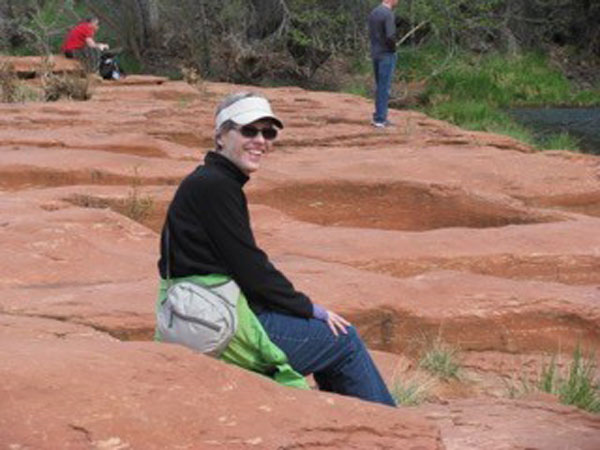Sitting on the smooth red rocks of Sedona, Arizona during a much-anticipated trip with her husband, there was just one thought going through Debi Lascelle’s mind – how grateful she was to be alive.
In December 2010, the then 52-year-old smoker was diagnosed with lung cancer, fortunately caught early through her participation in The Terry Fox Research Institute's Pan Canadian Early Lung Cancer Detection Study at The Ottawa Hospital.
“Being involved in this study quite literally saved my life,” said Lascelle, who had a 13-milimetre adenocarcinoma removed from her right lung through surgery.
“How do you adequately find a way to say, “thank you for my life”? It’s been seven years and I still haven’t found a way.”
Lung cancer is the most common cause of cancer death around the world, with 1.6 million deaths and 1.8 million new cases a year. The five-year for survival rate for patients is currently less than 18 per cent, but if caught early enough the disease can be cured for 70 per cent of cases.
The original TFRI pan-Canadian study was conducted in eight cities across the country between 2008 to 2016, and was so successful that in 2017 the project was extended to look at other variables such as genetics and air pollution.
“In the original project, we looked at the use of a risk prediction algorithm to identify people that would benefit from screening, but the best available model still only catches about 50 per cent of people that may develop lung cancer,” said principal investigator Dr. Stephen Lam, chair of B.C.’s Provincial Lung Tumour Group at the BC Cancer Agency and a professor of medicine at the University of British Columbia.
“That’s why we decided to look at other risk factors like air pollution, a major thing that nobody has ever looked at, and we also are looking at the genetic susceptibility factor to try and improve the prediction model that way.”
Now 60 – a birthday milestone she is thrilled to make – Lascelle enjoys yoga, going for bike rides along the river near her home, and spending time with her husband and friends. Having watched her father and a close friend lose their lives to lung cancer, she is encouraging anyone who has a history of smoking to take part in early detection studies.
“Do yourself and your loved ones a big favour and take part in a study that could save your life,” she says.
“It’s a small commitment of your time, the CT scan is painless, you’ll be well supported and quickly referred for further tests if anything is found. When cancer is caught early there’s so more much doctors can do – early detection makes the difference!”
